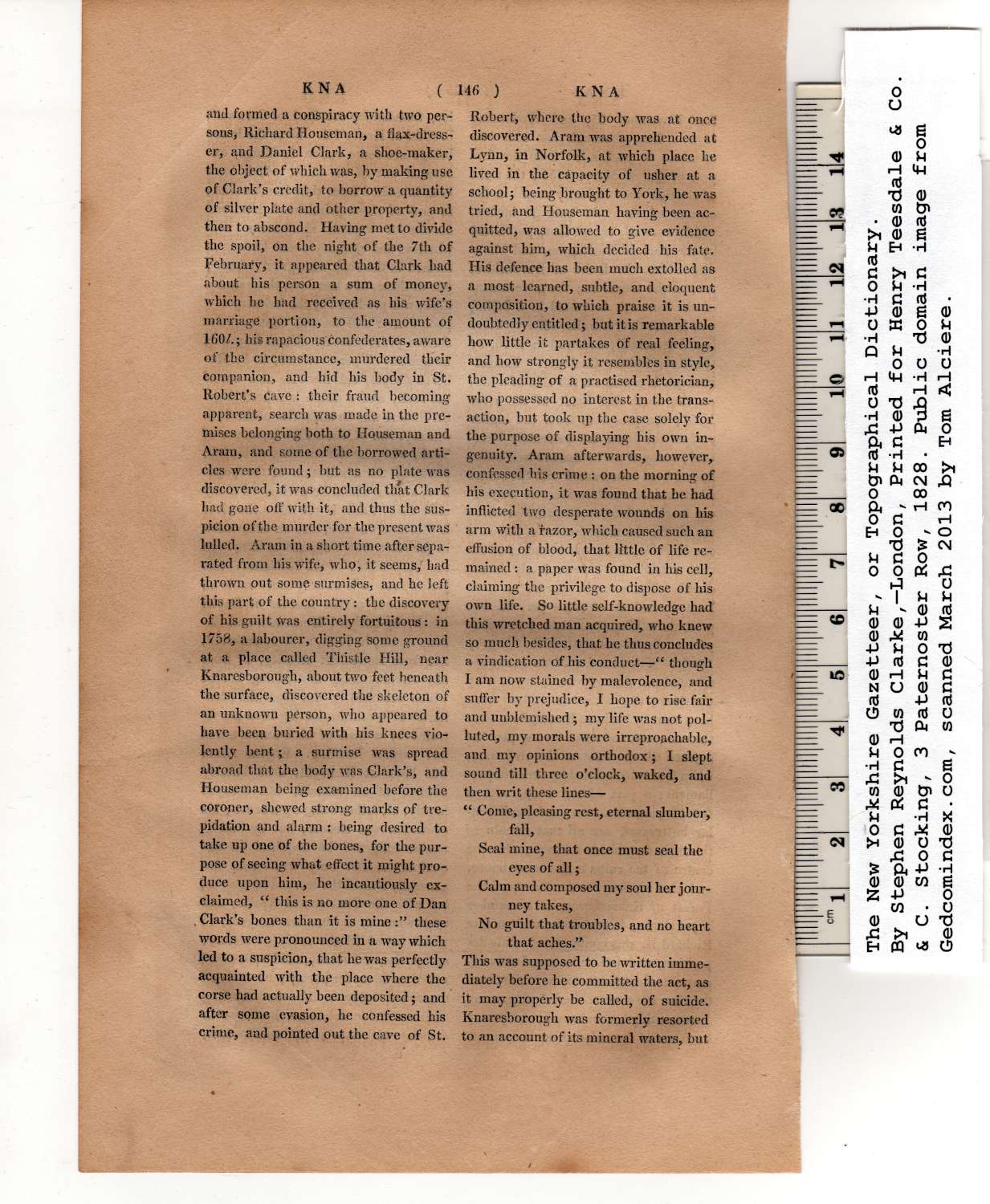|
and formed a conspiracy with two per-
sons, Richard Houseman, a flax-dress-
er, and Daniel Clark, a shoe-maker,
the object of which was, by making use
of Clark’s credit, to borrow a quantity
of silver plate and other property, and
then to abscond. Having met to divide
the spoil, on the night of the 7th of
February, it appeared that Clark had
about his person a sum of money,
which he had received as his wife’s
marriage jiortion, to the amount of
160/.; his rapacious confederates, aware
of the circumstance, murdered their
companion, and hid his body in St.
Robert’s cave : their fraud becoming
apparent, search was made in the pre-
mises belonging both to Houseman and
Aram, and some of the borrowed arti-
cles were found; but as no plate was
discovered, it was concluded that Clark
had gone off with it, and thus the sus-
picion of the murder for the present was
lulled. Aram in a short time after sepa-
rated from his wife, who, it seems, had
thrown out some surmises, and he left
this part of the country: the discovery
of his guilt Was entirely fortuitous : in
1758, a labourer, digging some ground
at a place called Thistle Hill, near
Knaresborough, about two feet beneath
the surface, discovered the skeleton of
an unknown person, who appeared to
have been buried with his knees vio-
lently bent; a surmise was spread
abroad that the body was Clark’s, and
Houseman being examined before the
coroner, shewed strong marks of tre-
pidation and alarm : being desired to
take up one of the bones, for the pur-
pose of seeing what effect it might pro-
duce upon him, he incautiously ex-
claimed, u this is no more one of Dan
. Clark’s bones than it is minethese
words were pronounced in a way which
led to a suspicion, that he was perfectly
acquainted with the place where the
corse had actually been deposited; and
after some evasion, he confessed his
crime, and pointed out the cave of St. |
Robert, where the body was at once
discovered. Aram was apprehended at
Lynn, in Norfolk, at which place he
lived in the capacity of usher at a
school; being brought to York, he was
tried, and Houseman having been ac-
quitted, was allowed to give evidence
against him, which decided his fate.
His defence has been much extolled as
a most learned, subtle, and eloquent
composition, to which praise it is un-
doubtedly entitled; but it is remarkable
how little it partakes of real feeling,
and how strongly it resembles in style,
the pleading of a practised rhetorician,
who possessed no interest in the trans-
action, but took up the case solely for
the purpose of displaying his own in-
genuity. Aram afterwards, however,
confessed his crime : on the morning of
his execution, it was found that he had
inflicted two desperate wounds on his
arm with a razor, which caused such an
effusion of blood, that little of life re-
mained : a paper was found in his cell,
claiming the privilege to dispose of his
own life. So little self-knowledge had
this wretched man acquired, who knew
so much besides, that he thus concludes
a vindication of his conduct—te though
I am now stained by malevolence, and
suffer by prejudice, I hope to rise fair
and unblemished; my life was not pol-
luted, my morals were irreproachable,
and my opinions orthodox; I slept
sound till three o’clock, waked, and
then writ these lines—
“ Come, pleasing rest, eternal slumber,
fall,
Seal mine, that once must seal the
eyes of all;
Calm and composed my soul her jour-
ney takes,
No guilt that troubles, and no heart
that aches.”
This was supposed to be written imme-
diately before he committed the act, as
it may properly be called, of suicide.
Knaresborough was formerly resorted
to an account of its mineral waters, but |
